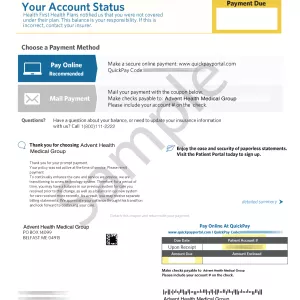Location Details
AdventHealth Medical Group Urology at Denver
Location Details
Our Practice Has Multiple Locations to Serve You
To request an appointment, please give us a call at 303-825-8822.
About Our Practice
Our experienced urologists and urology surgeons provide exceptional, personalized care to our patients. Our physicians are highly skilled in diagnosing and treating urology conditions like kidney stones, urinary incontinence, prostate cancer, urinary tract infections and erectile dysfunction.
Our practice’s urology experts stay current with the latest advancements in urological care — including robotic-assisted, minimally invasive procedures — and are committed to providing treatment plans tailored to every patient’s unique needs.
Meet the Experts Dedicated to Your Care
-

Lauren Abrams, MD
Urology
-

Ben Carpenter, MD
Urology
-

Julien Dagenais, MD
Urology
-

Richard Heppe, MD
Urology
-

Elias Hsu, MD
Urology
-

Daniel Kaufman, MD
Urology
-

Donald May, MD
Urology
-

Juan Montoya, MD
Urology
-

Brian Smith, MD
Urology
-

Carsten Sorensen, MD
Urology
-

John Tillett, MD
Urology
-

Lisa Zwiers, PA-C
Urology
-

Steve Bales, RN, NP
Urology
-

Cynthia Melton, NP
Urology
Our Services
- Bladder BOTOX®
- Cystectomy and neobladder
- Cystoscopies
- Kidney removal
- Laser and shock wave stone removal
- Minimally invasive surgical solutions
- Nephrectomy and partial nephrectomy
- Penile implants
- Prostate biopsy and removal
- Robotic-assisted surgery
- Slings for incontinence
- SpaceOAR™ Hydrogel
- Transurethral resection of prostate
- Vasectomy
Urologic Conditions We Treat
Our specialists provide comprehensive care for men’s urological conditions, including the following:
Prostate Health
- Prostate cancer
- Enlarged prostate/benign prostatic hyperplasia (BPH)
- Prostatitis
Penis Health
- Penile cancer
- Peyronie’s disease
Testes and Scrotum Health
- Testicular cancer
- Varicoceles
Bladder Health
- Bladder cancer
- Hematuria
- Neurogenic bladder
- Nocturia
- Urinary incontinence
- Urinary tract infections (UTI)
- Voiding dysfunction
Kidney Health
- Kidney and ureteral stones
- Kidney cancer
Reproductive and Sexual Health
- Erectile dysfunction (ED)
- Low testosterone
- Male fertility
- Post-spinal cord injury
- Premature ejaculation
Our specialists provide comprehensive care for a range of women’s urological conditions.
Bladder Health
- Bladder cancer
- Bladder prolapse
- Hematuria
- Interstitial cystitis (IC)
- Neurogenic bladder
- Nocturia
- Overactive bladder (OAB)
- Stress incontinence
- Urinary Fistula
- Urinary Incontinence
- Urinary tract infection (UTI)
- Voiding dysfunction
Kidney Health
- Kidney cancer
- Kidney and ureteral stones
Urogynecology
- Chronic pelvic pain
- Vaginal atrophy and laxity
- Vaginal vault prolapse
- Vesicovaginal fistula (VVF)

Benefits of Robotic-Assisted Surgery in Urology Care
Robotic-assisted surgery — using the da Vinci® robotic surgical system — requires fewer and smaller incisions, resulting in less pain and quicker recovery times.
Julien Dagenais, MD, is one of the highest-volume robotic-assisted surgeons in the area. Dr. Dagenais performed the first robotic-assisted radical nephrectomy with level II inferior vena cava (IVC) thrombectomy in Colorado.
Read more about the benefits of robotic-assisted procedures and how we treat and heal our patients.
Comprehensive Urological Care
- Bladder Cancer
-
Bladder cancer is the fifth most diagnosed cancer in the U.S., according to the American Cancer Society. More than 70,000 Americans are diagnosed with bladder cancer each year. Bladder cancer is more common among men than women, although rates have been increasing among women over the past 10 years.
The incidence of the disease increases with age; people over 70 are two to three times more likely to develop the disease than individuals between the ages of 30 to 54.
- Neurogenic Bladder
-
Damage to the nervous system may sometimes cause patients to lose normal bladder function, a condition known as neurogenic bladder.
Under normal conditions, the nervous system controls bladder function by sending messages from the brain to the bladder and from the bladder to the brain that signals a tightening or release of the bladder during urination. Patients suffering from this condition may experience an underactive bladder that is unable to contract or empty or an overactive bladder that contracts too quickly and frequently.
- Urinary Incontinence
-
Urinary Incontinence (UI) isn’t unusual. It’s estimated that more than 25 million adults in the United States experience temporary or chronic bladder leakage daily. While UI is more common in women over 50 than in other segments of the population, it can happen to anyone.
Depending on the cause and severity, treatment options range from medication and therapy to surgical procedures that include:
- BOTOX® injections
- Slings
- Sacral neuromodulation
- Tibial nerve stimulation
- Urinary Tract Infections
-
Urinary tract infections (UTIs) occur when bacteria enter the urinary tract and urethra and multiply. These infections typically develop in the lower urinary tract before progressing to the upper urinary tract if they remain untreated. Bladder infections (cystitis) are the most common form of urinary tract infections, but UTIs can also manifest as infections of the urethra or kidney infections. Women are more prone than men to developing UTIs. Children under the age of two can also develop this infection. E. coli is the most common bacterial cause of UTIs. Other forms of bacteria can also cause UTIs. Men and women sometimes can transmit bacteria to their partner during sexual intercourse, causing a UTI.
- Kidney Stones
-
Kidney stones (renal lithiasis) and ureteral stones (kidney stones that have moved to the ureters) are common in urological health. They are often caused by diet, lifestyle changes, and even family history.
More than 1 million cases of kidney and ureteral stones are diagnosed in the U.S. every year, with about 10% of Americans suffering from stone disease at some point during their lifetime.
We treat kidney stones through non-surgical and surgical care, but we’ll investigate the root cause of kidney stones. We conduct metabolic studies and create a customized plan to prevent future stones from forming.
Treatment options include:
- Shock wave lithotripsy
- Ureteroscopy with laser lithotripsy
- Percutaneous nephrolithotomy
- Robotic-assisted pyelolithotomy and ureterotomy
- Erectile Dysfunction
-
Erectile dysfunction is defined as the inability to achieve or maintain an erection. Chronic erectile dysfunction affects approximately 5% of men in their 40s and 15 to 25% of men over the age of 65. Transient erectile dysfunction can affect up to 50% of men between the ages of 40 and 70.
Under normal physiological conditions, neurotransmitters in the brain initiate an erection by sending messages to the vascular (blood) system to increase blood flow to the penis. The corpora cavernosa (tubes of connective tissue) and erectile tissue in the penis expand as a result of the increased blood flow and pressure. Following ejaculation, pressure in the penis decreases to reduce blood flow and allow the penis to resume its normal shape.
Patients with erectile dysfunction often experience negative psychological side effects. They may have low self-esteem or feel inadequate as a sexual partner. Partners of patients dealing with erectile dysfunction may also feel the emotional strain of the diagnosis.

Safe, Secure Online Bill Pay
It's easy to pay your bill online. Access your account and make a payment for services at all AdventHealth locations in one place. For information about your bill, call Call303-552-3024.
Urology Care Near You
AdventHealth Medical Group Urology at Denver AdventHealth Medical Group Urology at Denver
-
Hours Information:Please call for hours.
Take Health Into
Your Own Hands
Do more than ever before in one handy download.
- View Lab Results
- Pay Bills
- Message Your Care Team
- Schedule Appointments
- 24/7 Virtual Urgent Care
- Access Health Records with MyChart


